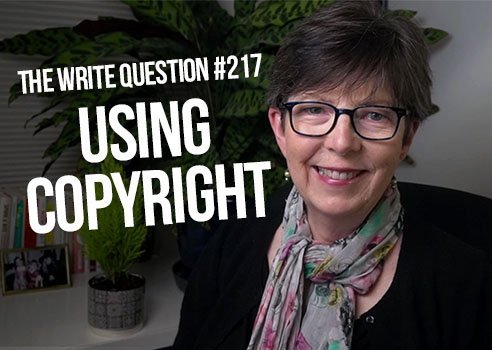Viewing time: 4 mins 55 secs
The Write Question is a weekly video podcast all about writing. Today’s question? How does copyright protect you? If you have a question you’d like me to answer you can email me, tweet me @pubcoach, or leave a message for me at the Skype account, The Write Question.
Transcript:
How does copyright protect you? That’s the topic I’m addressing today in The Write Question. I’m Daphne Gray-Grant, the Publication Coach.
I have a question from Bharat Sharma, a writer based in Delhi, India. Here’s what he’s asked by email…
“I have three questions about copyright laws. (1) As writers, do we hold copyright for all versions of our work or only for the latest version? (2) What’s the situation if I write an article that’s published and, later, another site publishes an article on the same topic and then copy and pastes my entire article into their new one? (3) What if a plagiarist steals an article published in, say, March 2021 and publishes it with a back date (like Jan. 2021). In such a scenario, how do I prove that I was the original writer?”
Thanks for your questions, Bharat. I need to begin by telling you that I’m not a lawyer and that your questions are all legal ones. I also want to emphasize that laws are different in every country so my answers are going to be very generic and may not reflect the laws that exist in India. That said, I’ve asked my friend Brian, a lawyer in Canada, to review my responses. Thanks, Brian!
Here is the information I can give you: If you are a freelance writer, copyright exists with you, unless you have sold that right or explicitly given it away. This applies to all versions of what you have written. And it remains until the copyright expires, which has different time limits in different countries.
Just keep in mind that if you’ve already sold first publication rights to a website or a company and if you are trying to sell something very similar to another website or company, both organizations should be informed of what you’re trying to do. The first company might reasonably be upset if you are trying to re-sell something that’s too similar to what you created for them. The second one might be upset that you’re selling them something that’s already appeared elsewhere.
Also understand that if you are in a media job as, say, a reporter for a newspaper, or a writer for a content farm, then the copyright is held by your employer, not by you. They will continue to hold this copyright even after you’ve left the organization, unless you have a contract providing differently.
Question two relates to dishonest actors who explicitly steal content written by others. Here is where you are wise to monitor how the information you’ve written may be being “stolen” from you. Regrettably, in the age of the internet, it is very easy to copy and paste text.
You should do regular Google searches to find plagiarized content — I do this once a month for both my books. Then, if I find a misuse, I issue what’s called a ‘DMCA takedown’. Google that phrase if you want more info about it.
Also, be aware that you can copyright only what you write, not the broader topic or idea.
Question three relates to timing. If you ever write something you think is so groundbreaking that it might be stolen, you can always email a copy to yourself showing the date on which you wrote it. As for how to prove that another site has back-dated the material they’re posting, you’d need to speak with a computer expert to determine how to prove that point. I’m guessing there’s probably a way to do it.
Finally, let me wrap up with the words of the American musician Mike Posner: “From what I understand about Shakespeare there was no copyright law when he was writing. He sampled at will, and it wasn’t seen as a bad thing.”
Bharat, some writers worry unnecessarily about legal protection, which is why I’ve ended with that quote about Shakespeare. See the show-notes below for a video exploring the “unnecessary worry” line of inquiry.
But the detailed nature of your questions makes me suspect that you’ve had a recent bad experience. You may wish to get some specific advice from a legal expert in your own country. Just be aware that pursuing legal options is likely to be expensive.
*
Viewers, if you have any writing-related questions, I’d be happy to do a video on them. Just send me a quick email, daphne@publicationcoach.com, or put a note in the comments section of this video.
And, if you’d like to learn more about how to make writing a happier and more rewarding process, check out my latest book Your Happy First Draft. I don’t sell it in bookstores or via Amazon. The only place to buy it is on my website, link on the screen below and in the show notes.
Links
How do you protect intellectual property for writers? (video)


